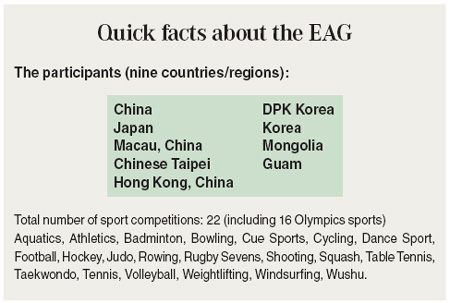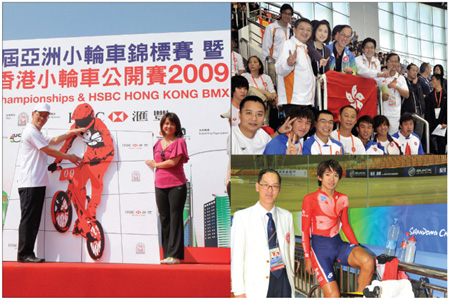Hong Kong has advantages in promoting elite sports
Updated: 2009-11-06 08:18
(HK Edition)
|
|||||||
|
Tsang Tak-sing officiates at the opening cereomony of the BMX park (left), cheers for the Hong Kong swimming team (right above) and cyclist Wong Kam-po (right below) at the 11th National Games held in Jinan, Shandong province. |
Hong Kong enjoys unique advantages in the development of sports in the city and the hosting of the 5th East Asian Games provides a good opportunity for Hong Kong to move forward, Secretary for Home Affairs Tsang Tak-sing told China Daily.
Hong Kong has made use of the opportunity to upgrade its sports facilities to welcome the coming of the East Asian Games. If the competition turns out to be a success and local athletes perform well, it will play a very proactive role in sports development in the city.
After the 2008 Beijing Olympics, the Elites Sports Committee under the Sports Commission that he chairs evaluated the strengths of Hong Kong sports, Tsang disclosed.
Among the 22 sports, the committee singled out four elite sports, namely, badminton, cycling, table tennis and windsurfing, as priority target sports for further development in Hong Kong.
"We have input additional resources into these four elite sports, with a view to enhancing Hong Kong's chance of winning medals at the 2010 Asian Games in Guangzhou, as well as the Olympics Games to be held in London in 2012," he remarked.
To provide greater incentives to the elite athletes, the government has announced the increase of the amount of prize money from HK$1 million to HK$3 million for gold medal winners at the next Olympic Games, and from HK$250,000 to HK$400,000 for gold medalists at the forthcoming Asian Games.
For the purpose of developing new blood, the government has set aside funds to enable various sports associations to run feeder programmes for budding athletes and to encourage more youngsters with athletic potential to develop a career in sports.
To enhance sports development at the district level, the government has earmarked funds from now through the next couple of years. The funds will enable sports associations and organizations to add new facilities and new equipment, he said.
The government also encourages promotion of "selected sports in selected districts". For example, given there are many beaches in the southern district, it is an ideal place to promote windsurfing.
Similarly, Shing Mun River in Shatin district is a good place for promotion of rowing.
To allow the elite athletes to concentrate on sports training, the government also has reached an understanding with local tertiary institutions. For elite athletes who are attending universities, they will be allowed to keep their school places until completion of their sporting career. Tsang said.
The government has also in place retirement arrangements for the athletes so that they do not have to worry about their retirement life.
"We have agreed with 10 major commercial corporations to provide employment to the retiring athletes, thus making them feel more assured about the future," he said. "This also makes the parents more willing to allow their children to become involved in sports and see it as a career. In addition, the success stories of cyclist Wong Kam-po and windsurfing queen Lee Lai-shan have also changed people's views on the status of athletes in Hong Kong."
In his view, Hong Kong enjoys certain advantages in the development of sports, with the first advantage being its openness that attracts many talents to come to Hong Kong.
Taking cycling as an example, Tsang noted that the coach of the cycling team, Shen Jinkang, came from Shanghai. "Since he has come, he has changed and raised the standard of the Hong Kong cycling scene," said Tsang.
"Many mainland cities, including Shanghai, now desperately want him back, but he prefers to stay put. Wong Kam-po is the main reason for his stay, and Shen also feels Hong Kong is the place where he can make the most of himself as a coach."
Equestrian events are another example, he added.
Patrick Lam, who won a gold medal at the 11th National Games recently, is of mixed ancestry, as his father is a Hong Kong citizen and his mother is an Austrian.
"The unique situation of Hong Kong manages to attract and generate many talents, which is why Hong Kong enjoys advantages in the promotion of sports," he said.
"Though Hong Kong was a bit late in sports development, the sports associations feel that the government has now in place a very clear direction and framework in sports development in Hong Kong," said the home affairs chief.
But Tsang admitted that there is no such thing as a sports bureau responsible for development of sports in Hong Kong at the present, and the responsible department is merely the Leisure and Cultural Services Department.
"The government spelled out a policy on sports 10 years ago," he said. "Though we do not have a sports bureau, promotion of sports is going on effectively within the existing framework. At the departmental level, there is a group of senior staff responsible for sports, at the same time as a team, headed by a senior official at deputy secretary level, in charge of sports policy."

(HK Edition 11/06/2009 page4)
